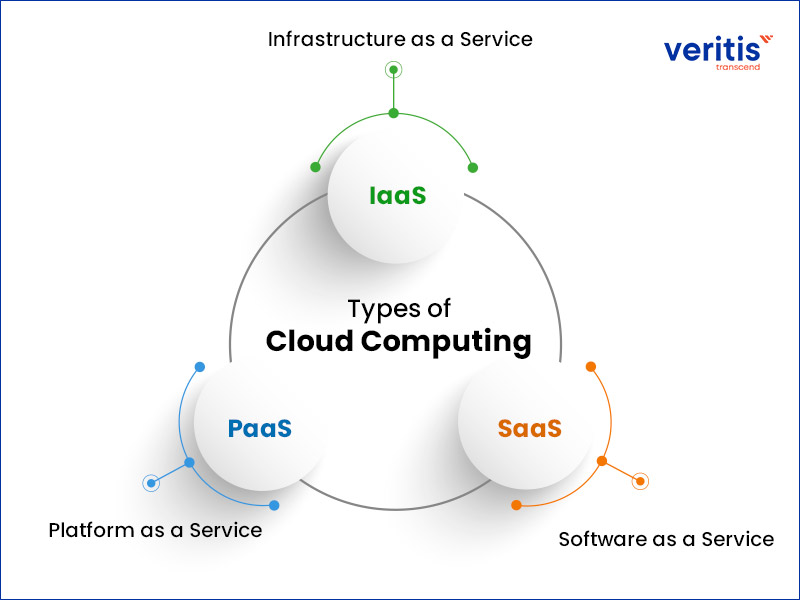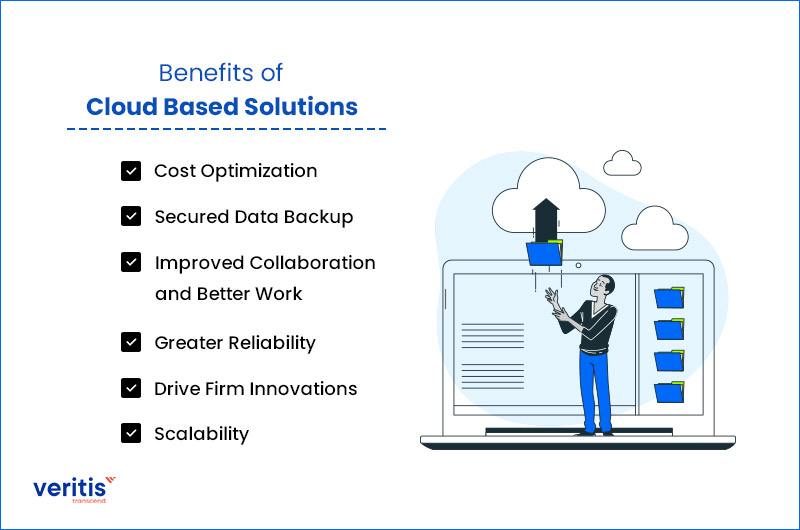
Table of contents
Small and medium-sized firms now have the chance to get to the top thanks to the revolution and innovation in cloud technology. As a result, small and medium-sized enterprises (SMEs) are being given opportunities to expand their operations’ scope. Small businesses now have access to markets that larger firms previously dominated because of cloud adoption. It gave SMEs significant competitive advantages and enabled them to compete in a much bigger business environment as everything became on-demand and need-based.
The cloud offers SMEs a more intelligent and efficient IT alternative that reduces costs and increases production. In addition, the cloud based solutions provide SMEs with a wide range of clear advantages, such as enhanced data security, decreased downtime, and flexible storage. And CRM administration, resource optimization, and remote computing, to mention a few.
As a business owner, you constantly look for ways to boost sales while maintaining high effectiveness, cost, and quality standards. You can achieve all these goals with the help of the cloud!
Although it has been around for two decades, cloud migration strategy has become increasingly popular over the past five years because of our growing reliance on and usage of data. First, however, many people must be aware that they use cloud computing daily. Netflix streaming involves the use of cloud computing. Likewise, using the bank’s mobile app to check your account balance is a cloud-based method. Applications that rely on cloud computing include Facebook and Instagram. And chances are you depend on cloud computing infrastructure to address numerous business difficulties if you run a small firm, whether using apps to manage your task while moving or sending emails.
Over the internet, cloud infrastructure provides computing services. Access to web-based applications, data processing, storage, and other services is in demand for small businesses. The infrastructure as a service (IaaS) model, software as a service (SaaS) model, and platform as a service (PaaS) model are some of the services offered by cloud computing. Accessible data, automated syncing, ease of remote work, and simple backups are a few advantages of cloud computing for business.
Consult our Cloud Consulting Expert
What is Cloud Computing?

Cloud computing is the on-demand provision of computer services, such as software, data processing, and data storage, over the internet. Cloud computing services are often paid for on a pay-as-you-go basis. So, you only pay for the cloud services and applications you utilize. This strategy enables flexible growth and lowers your company’s operating costs.
In today’s rapidly evolving business environment, small business owners must have access to data and apps from their PCs, tablets, or mobile phones. Whether at work, on the road, or in the field. This access from anywhere is made possible via cloud insights and an internet connection.
Instead of storing files on an exclusive hard disc or local storage device, they can be saved to a remote database thanks to cloud based solutions storage. Furthermore, a device with internet access can access the data and software programs required to run them.
Types of Cloud Services
No matter the service type, cloud computing services provide users with several benefits, such as:
- On-demand software delivery
- Data retrieval, backup, and storage
- Developing and testing apps
- Streaming audio and video
- Analyzing Data
Despite the fact that it is a relatively new technology, cloud native applications are being used by multiple industries, including large corporations, small businesses, charitable organizations, governmental agencies, and even individual consumers.
Useful link: What is Cloud Computing?
Types of Cloud Computing

Cloud computing is not a standalone technology like a chip or phone. Instead, it is a system made up mainly of three services: Platform-as-a-Service (PaaS), Infrastructure-as-a-Service (IaaS), and Software-as-a-Service (SaaS).
1) Platform as a Service (PaaS)
PaaS is regarded as the most complicated of the three cloud computing layers. While SaaS and PaaS are comparable in some respects, the main distinction is that PaaS delivers software offline rather than online. It is a platform for software development that is made available online. Platforms like Salesforce.com and Heroku are part of this strategy.
2) Infrastructure as a Service (IaaS)
IaaS refers to a technique for providing anything as part of an on-demand service over IP-based connectivity, including operating systems, servers, and storage. So, instead of buying servers or software, clients can use an on-demand, outsourced service to obtain these resources. Microsoft Azure and IBM Cloud are two common instances of the IaaS system.
3) Software as a Service (SaaS)
SaaS refers to the licensing of a software application to users. A pay-as-you-go or on-demand mechanism is generally used to provide licenses. For instance, this kind of mechanism is available in Microsoft Office 365.
Useful link: What are the Different Types of Cloud Computing Services?
Benefits of Cloud Based Solutions

Enterprises from all sectors can benefit from using cloud-based software, which can be accessed by the browser or native apps on any device. In addition, users may seamlessly transfer their files and settings from one device to another. There are a few benefits of cloud computing. Let’s have a look!
1) Cost Optimization
Operational cost optimization is the main advantage of cloud computing. You will need to install less IT equipment and pay less for an upkeep if you switch to a cloud ERP system. In addition, although I wouldn’t advise SMEs to do away with their IT teams completely, it will significantly reduce the burden on those teams if you move most of your activities to cloud adoption. Finally, cloud resources offer a practical means of accommodating spikes in corporate activity or transaction volume that could bring down conventional systems.
For starters, you no longer need to make substantial capital investments in acquiring, upgrading, and maintaining prohibitively expensive servers, PCs, and their associated software or hardware. Because the service providers oversee the system’s security, upkeep, and upgrades, cloud based solutions offer great operational cost certainty over the long run.
2) Secured Data Backup
For a small firm, data loss can be disastrous. And it’s not just because the files were lost; it’s also because it took time and money to restore them. The cost of a network outage is above USD 10,000 per hour, according to CloudRadar.
Most small firms don’t invest in dependable data recovery; it’s more of an ideal. Many SMBs are now turning to cloud computing to counter this trend for small businesses. Cloud based services can quickly recover data from all types of data disasters due to their size and competence, including remotely deleting data from a lost laptop.
3) Improved Collaboration and Better Work
According to Gartner, 74 percent of CFOs want to transfer 5 percent of their employees to remote jobs permanently. Thus, even if the pandemic may have expedited the remote working trend, most firms, particularly SMEs, are now aware of its potential benefits for operational effectiveness. Because of this, cloud computing models for remote workers have significantly increased globally.
Remote employees can connect and communicate with other teams with the help of cloud-based monitoring. SMEs and established enterprises observe a paradigm shift in their operational efficiencies because of mobile information access. The cloud ERP system serves as a platform that ensures fast and secure access to information and has enabled everyone to operate remotely. You can immediately produce the necessary data before the IT department.
4) Greater Reliability
Services delivered over the cloud infrastructure are frequently more dependable than services provided on premises. Especially if servers or other hardware are outdated. Since cloud solution providers have a dedicated, experienced IT staff, they can handle issues more quickly than small businesses with limited IT resources.
5) Drive Firm Innovations
What if your company had a secret weapon up its sleeve that would save expenses, please customers, boost productivity, open new revenue streams, and expand into new markets? According to a recent study by the IBM Institute for Business Value, cloud-based monitoring generates revenue for SMEs and organizations in many sectors. According to this survey, cloud-based workflow gives SMEs the ability to;
- Obtain simple access to a new market or sector
- Increase service or product features while maintaining usability
- Acquire new clients
- Introduce innovative client journeys crafted for distinct client experiences
- Develop, create, and launch services and products quickly
Most businesses began utilizing cloud resources for small businesses about half a decade ago to reduce operational costs and streamline their IT infrastructure. However, you don’t use the power of cloud-based software to drive enterprise innovation today. Then, your company runs the danger of being outflanked by competitors.
6) Scalability
Scalability is the ability to adjust IT resources to accommodate shifting business needs in cloud services for business. It is the most defining characteristic of cloud computing models and why SMEs embrace it at an exponentially increasing rate.
The existing cloud computing infrastructure allows for the scalability of data storage capacity, networking, and processing power. In addition, unusually, little to no downtime or interruption is required to complete it swiftly.
Useful link: Cloud Computing: Trends, Challenges and Benefits
Conclusion
There is no doubt that cloud solutions have a wide range of benefits for small and medium business owners. They enable you to focus on your mission and core competencies while leaving the rest to the cloud platform. In addition, cloud solutions’ scalability and flexibility allow you to advance quickly and take competitive advantages.
The significant potential is being lost if your SME doesn’t have cloud solutions. An opportunity to develop, take the lead, and be inspirational. The industry is quite competitive; therefore, it will be beneficial to use technologies that can streamline your business operations and cut down on time.
Veritis, the Stevie Award winner, offers IaaS, PaaS, and SaaS solutions to many global SMEs. The benefit of our cloud and IT solutions is significantly improving their overall business process. If you believe it’s the right time to experience the ride of the cloud, get in touch with Veritis to know more about our customized services.
Explore Cloud Services Got Questions? Schedule A Call
Additional Resources:
- Cloud Computing in Healthcare: Looking for Security Advantage?
- The Biggest Clouds Myths that Every Organization Must Do Away With
- AWS Vs Azure Vs GCP – The Cloud Platform of Your Choice?
- Global Cloud Market to Reach Nearly USD 800 Billion by 2028: Survey
- Cloud Security Automation: Best Practices, Strategy, and Benefits
- 9 Keys to Selecting a Right Cloud Managed Services Provider (MSP)
- Cloud Infrastructure Automation: The Imperative for Cloud Success!
- Hybrid Cloud Vs Multi Cloud: What’s the Difference!